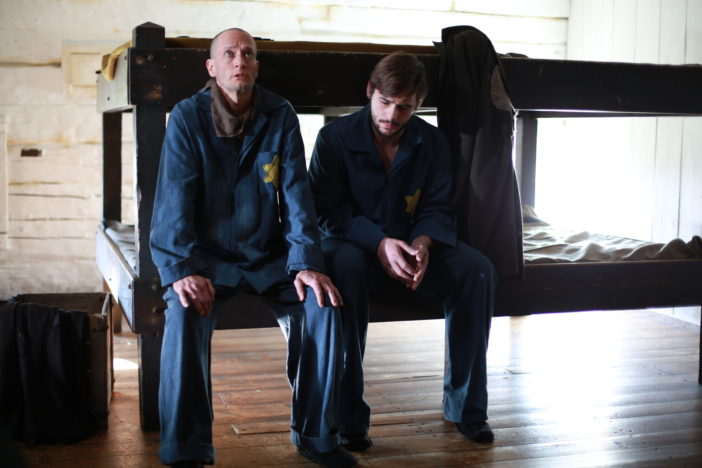A largely unknown story from the annals of Auschwitz is coming to life on the big screen.
Eleftheromania is the title of the film, which comes from the obscure word (eleutheromania) meaning “man’s innate desire to be free” and comes from two Greek words— eleftheria (freedom) and mania (desire).
Based on a true story, the 20-minute short film follows author and Auschwitz survivor Piroska (Olympia Dukakis) as she shares a story in contemporary time from her harrowing past to a journalist (Anthoula Katsimatides). The film then flashes back to the 1940s inside the death camp.

One of the scenes needed the building of a train car that depicted the arrival of incoming prisoners.
In the summer of 1944, Nazis enlisted 446 Greek prisoners to the horrific task of working as Sonderkommando and leading prisoners into gas chambers.
If they refused, they would be killed. After being given the despicable order, the Greek prisoners had a moral debate in their barracks. Piroska, one of the prisoners, bore witness to their astonishing decision.

Young Piroska, a Hungarian prisoner at Auschwitz.
The idea for the film came to life after Gregory C. Pappas, stumbled upon a diary entry by a Holocaust survivor that mentioned the Greek prisoners and their dilemma and bravery.
After several years of research, which included scouring the archives at Auschwitz in Poland and official testimonies from SS officers in archives in Berlin, Gregory teamed up with Toronto-based writer Joanna Tsanis who transformed the true story into a screenplay.
Original documents from Auschwitz archives, including prisoner directories, gave the filmmakers fascinating details, including where the men came from, when they arrived at the camp, even their tattoo numbers.

Quarantine records detailing the arrival of the train from Athens and the tattoo numbers assigned to the Greek prisoners who were featured in Eleftheromania.
During his visit to the camp in Poland, Pappas was even able to locate the barracks where the men were held, which led to excellent resources for set and location scouting.
(Pappas has written more about the visit on his personal page here.)
Soon Eleftheromania became a team of over 70 members of Ontario’s talented film community including award-winning director David Antoniuk and producer Chuck Scott and dozens of actors, extras and production support.
Eleftheromania was mostly filmed in Toronto. The contemporary scenes were shot in New York City.
Directed by David Antoniuk, written and produced by Joanna Tsanis, produced by Chuck Scott and Gregory C. Pappas, and starring Academy Award winner Olympia Dukakis, Eleftheromania is being submitted to film festivals across the globe.
With music playing a central role in the film’s story, and one Greek song in particular, Glykeria was enlisted to sing the song “Minore Tis Avgis” for the closing credits.
The team’s aim is to share this widely unknown but widely important story with the world. Details about screenings and film festivals will be shared on the film’s website and Facebook page.
“How we live our lives and the choices we make define the margins of morality for those who come after us. In Eleftheromania a woman recounts the story of people having life or death choices foisted upon them. This story is one that needs to be honored and retold again and again,” according to Antoniuk.

A scene inside the barracks while prisoners contemplated freedom, and death.

From Gregory Pappas’ journal entry: “Following extensive research, I uncovered that the 464 Greek prisoners were placed in barrack number 8 in the quarantine section of the camp, which my guide was able to help me locate.”

3 comments
And to think that the majority of Greeks are anti-Semitic and even Holocaust deniers!!!
I don’t believe for one moment that your comment “the majority……Holocaust deniers” is at all correct. Greeks have been slaughtered by turks, a long time before the holocaust, they knew death at the hands of terrorists, they are not anti-Semitic, we are from the same source.
Not sure where that previous comment came from. Sweeping generalizations are an indicator of tunnel vision. The aforementioned statement is not true within my first-generation Greek circles.